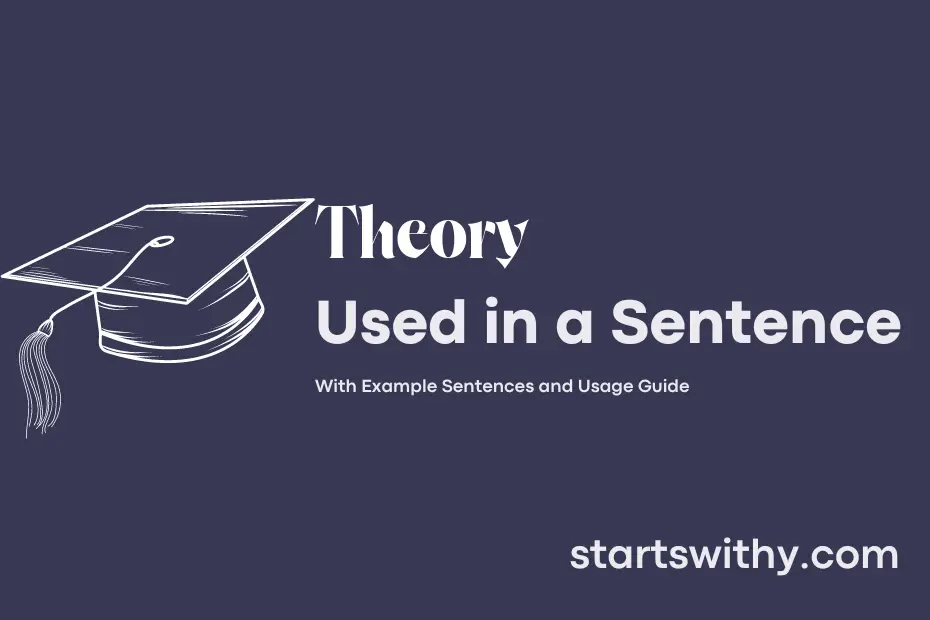Have you ever wondered about the underlying principles that guide our understanding of the world? A theory is a structured explanation that describes and predicts various phenomena within a specific field of study.
In science, psychology, sociology, and many other disciplines, theories serve as frameworks for organizing and interpreting data. They help researchers make sense of complex concepts by proposing explanations based on evidence and logic.
7 Examples Of Theory Used In a Sentence For Kids
- Theory is like a big guess about how things work.
- We can learn a lot by testing out a theory.
- Scientists use theories to help them understand the world.
- Let’s think of our own theory about why the sky is blue.
- Theories can change as we learn more about a topic.
- It’s fun to make up a little theory and see if it’s true.
- The more we learn, the more our theories might grow and change.
14 Sentences with Theory Examples
- Theory plays a crucial role in understanding complex concepts in subjects like physics and mathematics.
- Students are often tasked with applying theory to practical situations in order to solve problems effectively.
- It is important for college students to grasp the fundamental theory behind each subject in order to build a strong academic foundation.
- Professors often encourage students to critically analyze theories and offer their own perspectives during classroom discussions.
- Group study sessions can be beneficial for sharing different interpretations of theories and deepening understanding.
- College libraries are filled with textbooks and reference materials that provide in-depth explanations of various theories.
- Research projects allow students to explore cutting-edge theories and contribute to expanding knowledge in their field.
- Online platforms offer a wealth of resources, from video lectures to interactive quizzes, to help students grasp complex theories.
- Understanding different learning theories can help students adopt the most effective study strategies for their individual needs.
- Practical assignments and experiments are often designed to test how well students can apply theories to real-world scenarios.
- Professors may offer extra credit for students who demonstrate a strong understanding of advanced theories beyond the standard curriculum.
- Study groups can be a great way to collectively review challenging theories and prepare for exams.
- College students may find it beneficial to attend guest lectures or seminars on the latest research theories in their field of study.
- Writing essays and reports often requires students to synthesize multiple theories to construct a cohesive argument.
How To Use Theory in Sentences?
Theory is the framework that helps us understand and explain different phenomena, observations, or situations. When using the word theory in a sentence, it is important to remember a few key points. First, theory should be used in a context that involves a proposed explanation based on limited evidence, rather than a fact. For example, “The theory of evolution suggests that species change over time through natural selection.”
Second, when referring to a specific theory, such as the theory of relativity or the Big Bang theory, it is important to capitalize the word theory to indicate that it is a proper noun denoting a specific concept or principle. For instance, “Albert Einstein’s Theory of Relativity revolutionized our understanding of space and time.”
Additionally, when discussing multiple theories, it is essential to use the plural form of the word, which is “theories.” For instance, “There are several competing theories about the origins of the universe.”
In summary, theory is a versatile term that can be used in various contexts to explain, analyze, or predict phenomena. By following these guidelines and understanding the nuances of the word theory, you can effectively communicate your ideas and thoughts in a clear and concise manner.
Conclusion
In conclusion, the examples of sentences with the keyword “theory” illustrate its diverse applications across different fields of study. Whether discussing scientific hypotheses, philosophical frameworks, or educational principles, theories serve as systematic explanations for phenomena. For instance, scientists use theories to predict and understand natural phenomena, while educators rely on theories to guide instructional practices and classroom management. Furthermore, in disciplines such as psychology and sociology, theories help researchers develop insights into human behavior and societal dynamics.
Overall, the variety of sentences showcasing the word “theory” highlights its significance in shaping our understanding of the world. By providing frameworks for interpretation and prediction, theories play a crucial role in advancing knowledge and driving intellectual inquiry across various academic disciplines.



